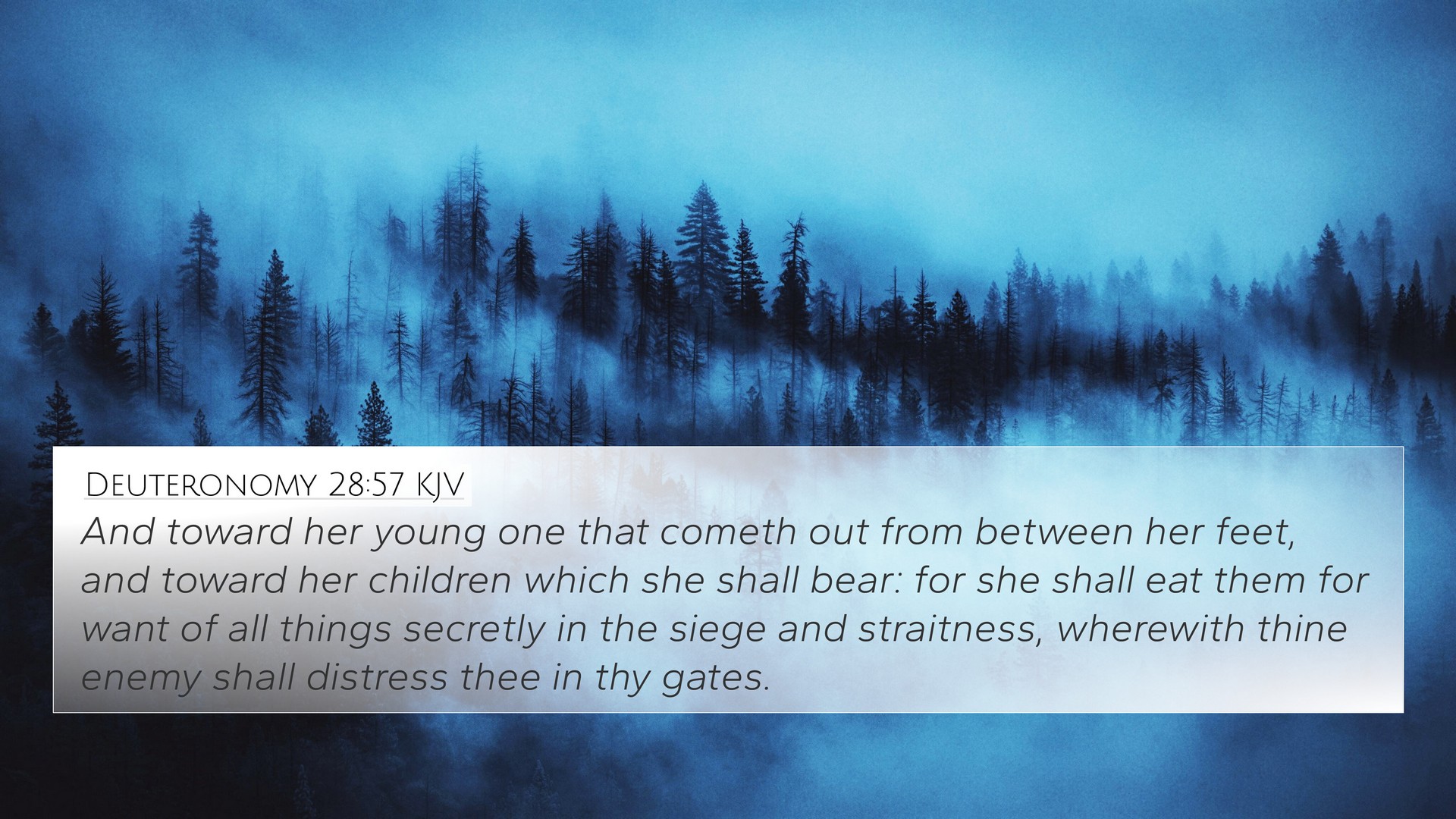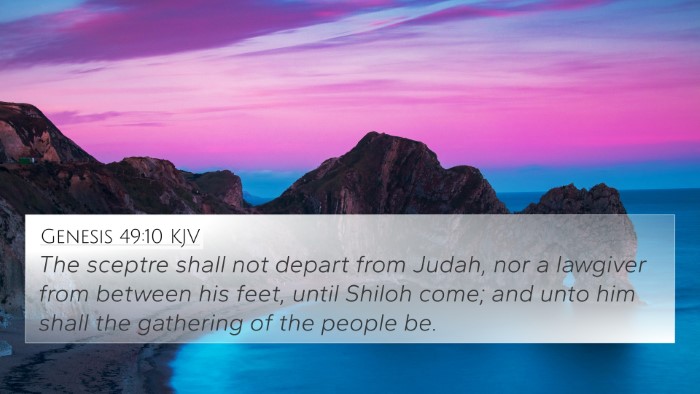Understanding Deuteronomy 28:57
Deuteronomy 28:57 states:
"And toward her children that she shall bear: for she shall eat them for want of all things secretly in the siege and straightness, wherewith thine enemies shall distress thee in thy gates." (KJV)
This verse is part of the broader discourse on the curses that would fall upon Israel if they turned away from obedience to God. The severe nature of these curses highlights the grave consequences of disobedience and the dire straits the people could face in times of siege.
Commentary Insights
This commentary integrates insights from notable public domain commentators such as Matthew Henry, Albert Barnes, and Adam Clarke to provide a comprehensive interpretation of Deuteronomy 28:57.
Matthew Henry’s Commentary
Matthew Henry emphasizes the extreme desperation that would lead a mother to consume her own children during a siege. He points out that this imagery serves to illustrate the depth of the curse and the moral decay that results from abandoning God's commandments. Henry warns that such calamity arises not simply from military defeat but from turning away from God’s providence and protections.
Albert Barnes’ Commentary
Albert Barnes discusses the context of warfare and siege, explaining how such circumstances often drive people to the brink of survival. He notes that this verse serves as a somber reminder of the depths of suffering that can occur when a nation strays from its covenant with God. Barnes also relates this verse to broader biblical themes of judgment and mercy.
Adam Clarke’s Commentary
Adam Clarke provides a more detailed view of the suffering described in this verse, suggesting that it showcases the ultimate misery that can befall a society. Clarke also interprets the act of consuming one's children as a symbol of ultimate despair, reflecting a societal breakdown. He underscores the implications of such actions and the loss of affection and conservation within families during dire situations.
Cross-References and Related Bible Verses
Deuteronomy 28:57 connects with numerous other scriptures that draw on similar themes of judgment, suffering, and societal collapse. Here are some notable Bible cross-references:
- Leviticus 26:29 - "And ye shall eat the flesh of your sons, and the flesh of your daughters shall ye eat." This verse parallels the horror expressed in Deuteronomy 28:57 regarding dire circumstances.
- 2 Kings 6:28-29 - "And the king said unto her, What aileth thee? And she answered, This woman said unto me, Give thy son, that we may eat him today..." This narrative illustrates extreme desperation during a siege.
- Jeremiah 19:9 - "And I will cause them to eat the flesh of their sons and the flesh of their daughters..." This verse reflects the continuation of themes of divine judgment and calamity.
- Lamentations 2:20 - "Behold, O LORD, and consider to whom thou hast done this. Shall the women eat their fruit, and children of a span long?" Questions the extent of the suffering.
- Matthew 24:19 - "And woe unto them that are with child, and to them that give suck in those days!" Jesus uses a similar motif about hardships to come.
- Micah 3:2-3 - "Who pluck off their skin from off them, and their flesh from off their bones;" These verses underline the brutal treatment of the innocent within society that can lead to complete moral decay.
- Ezekiel 5:10 - "Therefore the fathers shall eat the sons in the midst of thee, and the sons shall eat their fathers..." Emphasizes the destruction caused by disobedience to God.
Thematic Connections
The themes within Deuteronomy 28:57 demonstrate the connections between Bible verses that revolve around judgment for disobedience and the consequences of turning away from God. Understanding these connections provides deeper insight into the thematic ramifications of disobedience throughout Scripture.
Tools for Bible Cross-Referencing
For those interested in studying themes such as those present in Deuteronomy 28:57, utilizing tools for Bible cross-referencing is essential. Resources like a Bible concordance and Bible cross-reference guide can help one identify and explore these connections more fully.
Conclusion
This scriptural passage serves as a stark warning and an exploration of the depths of despair that can arise from turning away from God's ordinances. The rich tapestry of cross-references helps elucidate the ongoing narrative of judgment, suffering, and the cyclical nature of divine retribution throughout the Bible. Engaging in cross-referencing Bible studies allows believers to grasp better the serious implications of their faith and conduct.
Further Reflection
As you meditate on the meaning of Deuteronomy 28:57, consider how the themes of judgment, societal collapse, and desperation resonate not only within the text itself but across the broader biblical narrative. Identifying connections between Old and New Testament, as well as recognizing the similarities between various scriptures, can deepen your understanding of God's word and His dealings with humanity.




